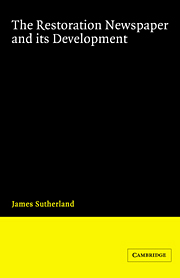Summary
In the reign of Charles II political comment was at best a precarious activity, and at the worst a highly dangerous one. The King and his ministers had never come to terms with the newpapers, and would have have been glad to see the nation served only by the London Gazette. Their attitude was precisely expressed by L'Estrange in 1663: newspapers made the people ‘too familiar with the actions and counsels of their superiors’, and gave them ‘not only an itch but a kind of colourable right and license to be meddling with the Government’. In the days when the only newspaper he could buy was the Gazette, the thinking Englishman must often have contrasted his situation with that in the Low Countries, where anyone had the liberty to read the day's news in a considerable variety of papers. When, in 1679, Englishmen became accustomed to choosing which paper they would read, a habit was formed that was not to be easily broken.
It is true that in 1680 the King had successfully asserted his authority, and had succeeded in suppressing the interloping newspapers for several months; but the very fact that they began to appear again at the end of the year offers some indication of the pressure from below that he had to contend with. (How far they had the financial support of Shaftesbury and the Country Party is a question that has never been satisfactorily determined.)
- Type
- Chapter
- Information
- The Restoration Newspaper and its Development , pp. 146 - 184Publisher: Cambridge University PressPrint publication year: 1986
- 1
- Cited by



